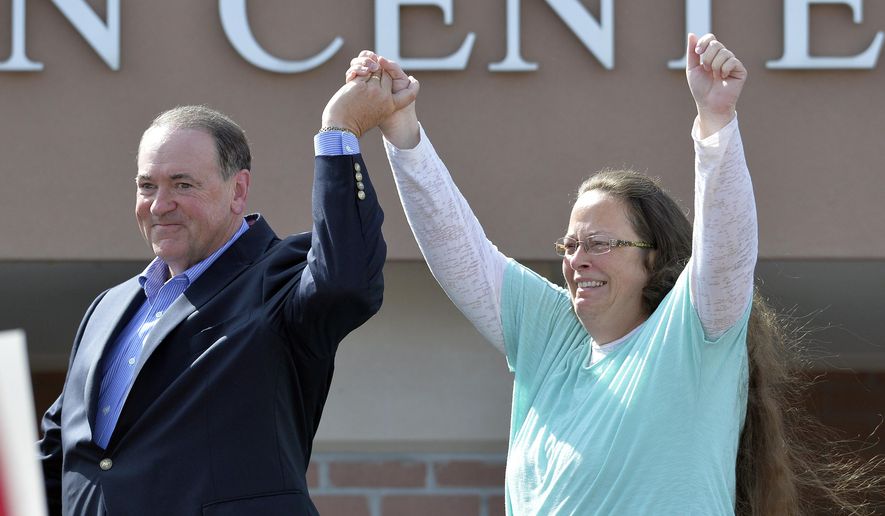Kim Davis, the Kentucky county clerk who has refused to issue marriage licenses to same-sex couples because of her Christian faith, has become the latest dividing line for the GOP presidential candidates, who still struggle to define the line between legitimate government power and respect for religious views.
Former Arkansas Gov. Mike Huckabee and Texas Sen. Ted Cruz, both 2016 GOP White House hopefuls, rallied to Ms. Davis’s defense Tuesday as she was released from jail Tuesday, where she’d been held since last week after defying the Supreme Court’s ruling this summer establishing same-sex couples have a constitutional right to get married.
With Mr. Huckabee and Mr. Cruz on hand as she walked out of jail, Ms. Davis appeared at a rally as Mr. Huckabee and other conservative leaders praised her stance as a bold statement for morality and religious liberty.
“I want you to know I am willing to spend the next eight years in jail, but I am not willing to spend one day under the tyranny of people who believe they can take our freedom and conscious away,” Mr. Huckabee told the crowd.
But not every 2016 Republican candidate agrees.
On the other side of the debate are former Florida Gov. Jeb Bush, Ohio Gov. John Kasich and New Jersey Gov. Chris Christie, who said Tuesday that Ms. Davis, as a public official, should have heeded the court’s ruling that she obey the law as interpreted by the Supreme Court.
“We have to follow the law and these licenses have to be issued,” Mr. Christie said on Fox News. “And if she has this objection, then we should move her to another job inside the government.”
Former Virginia Rep. Tom Davis, a Republican, said the schism in part reflects how the 17 candidates in the GOP field are looking for ways to score headlines.
“They are all fighting for oxygen,” Mr. Davis said. “So they are looking for differentiation. That is not to say that Huckabee and Cruz haven’t been constant on this issue.”
The GOP divisions over Ms. Davis, a Democrat, are part of an ongoing debate over religious liberty and the extent to which Republicans believe the government should be invested in decisions concerning morality.
Some political observers found it ironic that Ms. Davis’s defenders are some of the most vocal opponents of President Obama, whom they accused of breaking the law in carrying out Obamacare and making major changes to deportation policy for illegal immigrants.
“Conservatives are happy when government officials break the law for the reason of religious convictions, but condemn President Obama for exceeding the authority of his office,” said Darrell West, vice president and director of governance studies at Brookings Institution. “Their rhetoric seems driven more by their personal views on the issue at hand as opposed to the consistent application of principle.”
Rasmussen Reports released a poll Tuesday that showed a clear majority of likely voters disagreed with Ms. Davis’ decision not to uphold the law.
Of the 1,000 respondents, 26 percent said they “think an elected official should be able to a ignore a federal court ruling that he or she disagrees with for religious reasons” — compared to 66 percent who think she could carry out the law as the court interpreted it.
Rev. Barry W. Lynn, executive director of Americans United for Separation of Church and State, said the Republicans rushing to support Ms. Davis were confusing a “frankly trivial” situation with “major moral issues” of the past, and said they are trying to find a way to boost their lagging candidacies.
“I think breaking laws is something that is heralded when it fits the world views of conservative politicians and is abhorrent when it runs counter to their world view,” Mr. Lynn said. He added, “I think that the average American is tired of politicians who kind of can’t tell the difference between the Bill of Rights and the Ten Commandments and try to conflate the two.”
GOP strategist Mike McKenna said that the Davis case might not be the best example for Republicans to use in the religious freedom fight, but said that elected leaders must find better ways to balance religious convictions with the desires of the gay-rights movement.
“If the law can’t accommodate people’s religious beliefs, then guess what? People are going to find ways outside the law to accommodate themselves,” he said.
• Seth McLaughlin can be reached at smclaughlin@washingtontimes.com.




Please read our comment policy before commenting.